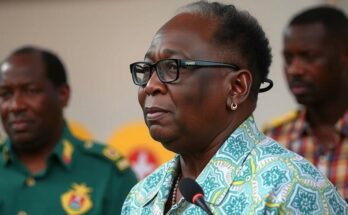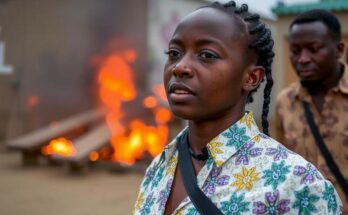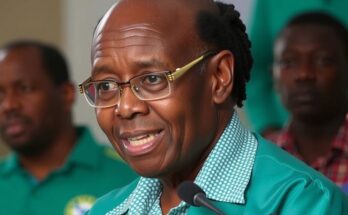The presidential election in Tunisia has commenced, with President Kais Saied favorably positioned for re-election amid a context of constrained opposition and diminishing public interest. Approximately 9.7 million voters are eligible, yet many express disillusionment towards the electoral process, having witnessed significant political repression and economic decline under Saied’s rule. High-profile opponents remain imprisoned, casting doubt on the integrity of the election and the future of democracy in Tunisia.
The presidential election in Tunisia commenced with the incumbent, President Kais Saied, set for re-election amidst a backdrop of limited competition and dwindling public interest. With approximately 9.7 million individuals registered to vote, the political landscape has shifted dramatically since Saied’s rise to power three years ago, with notable opposition figures now incarcerated. This election is perceived as marking the conclusion of Tunisia’s democratic experiment, which began with the Arab Spring in 2011. Polling stations across the country opened at 8 AM local time and are scheduled to close at 6 PM. The electoral authority, ISIE, anticipates preliminary results may emerge by Wednesday. Despite the numbers indicating potential voter participation, the palpable disenchantment among the electorate is underscored by the absence of vibrant campaign activities, rallies, or public discourse, predominantly featuring Saied’s posters throughout urban locales. A significant proportion of the populace has expressed apathy toward the electoral process. A young Tunisian, Mohamed, articulated this sentiment, noting a belief that voting would be “useless.” This feeling of resignation is further compounded by Tunisia’s ongoing economic crises and Saied’s consolidation of power after dissolving the parliament in 2021, which has effectively stifled dissent and led to the imprisonment of many political opponents. Human Rights Watch has reported that over 170 individuals remain incarcerated for political reasons or for exercising their fundamental rights. Key figures, such as Mohamed Ghannouchi, leader of the Ennahdha party, and Abir Moussi, head of the Free Constitutional Party, are among those imprisoned, raising concerns over the fairness of the election. The International Crisis Group’s analysis suggests that the current electoral climate is characterized by a lack of enthusiasm among citizens, who fear that a new term for Saied may exacerbate existing socioeconomic difficulties and further entrench authoritarian governance. Recent protests in Tunis reflect public discontent as demonstrators vocally oppose what they perceive as Saied’s manipulative governance.
Tunisia, recognized as the birthplace of the Arab Spring uprisings against authoritarian rule, has seen a regression in democratic freedoms under President Kais Saied. His rise to power was marked by significant shifts in the political landscape, including the dissolution of parliament and a crackdown on dissent. The political climate has been heavily influenced by economic hardships and a series of government actions that have led to the arrest of several key opposition figures. The current presidential election is significant not only for its potential outcomes but also for what it signifies about the state of democracy in Tunisia since the revolutionary fervor of the early 2010s. With high numbers of eligible voters juxtaposed against widespread disinterest in the electoral process, the nation stands at a crossroads.
In conclusion, the presidential elections in Tunisia, occurring under the shadow of President Kais Saied’s incumbency, reveal deep-rooted issues within the country’s political framework. With substantial opposition figures imprisoned and a populace expressing significant disenchantment, the elections serve as a poignant reminder of the struggles facing Tunisia’s democratic aspirations. The prevailing sentiment suggests a reluctance to engage in the electoral process, underscoring fears that continued support for Saied may deepen the nation’s sociopolitical and economic crises.
Original Source: www.aljazeera.com




